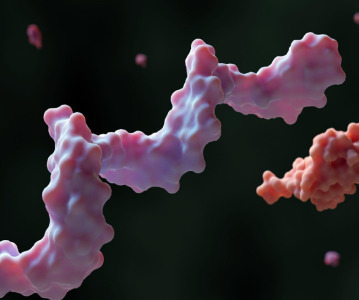Self-Assembling Anti-Cancer Molecules Created in Minutes: like 'LEGO Death Star'?

Researchers have developed a simple and versatile method for making artificial anti-cancer molecules that mimic the properties of one of the body’s natural defence systems.
The chemists, led by Professor Peter Scott at the University of Warwick, UK, have been able to produce molecules that have a similar structure to peptides which are naturally produced in the body to fight cancer and infection.
Published in Nature Chemistry, the molecules produced in the research have proved effective against colon cancer cells in laboratory tests, in collaboration with Roger Phillips at the Institute for Cancer Therapeutics, Bradford, UK.
Artificial peptides had previously been difficult and prohibitively expensive to manufacture in large quantities, but the new process takes only minutes and does not require costly equipment. Also, traditional peptides that are administered as drugs are quickly neutralised by the body’s biochemical defences before they can do their job.
A form of complex chemical self-assembly, the new method developed at Warwick addresses these problems by being both practical and producing very stable molecules. The new peptide mimics, called triplexes, have a similar 3D helix form to natural peptides.
“The chemistry involved is like throwing Lego blocks into a bag, giving them a shake, and finding that you made a model of the Death Star” says Professor Scott. “The design to achieve that takes some thought and computing power, but once you’ve worked it out the method can be used to make a lot of complicated molecular objects.”
Describing the self-assembly process behind the artificial peptides Professor Scott says: “When the organic chemicals involved, an amino alcohol derivative and a picoline, are mixed with iron chloride in a solvent, such as water or methanol, they form strong bonds and are designed to naturally fold together in minutes to form a helix. It’s all thermodynamically downhill. The assembly instructions are encoded in the chemicals themselves.”
“Once the solvent has been removed we are left with the peptide mimics in the form of crystals”, says Professor Scott. “There are no complicated separations to do, and unlike a Lego model kit there are no mysterious bits left over. In practical terms, the chemistry is pretty conventional. The beauty is that these big molecules assemble themselves. Nature uses this kind of self-assembly to make complex asymmetric molecules like proteins all the time, but doing it artificially is a major challenge.”
Whilst the peptide mimics created by the process have been successful in laboratory tests on colon cancer cells they will require further research before they can be used in clinical trials on patients. Nevertheless they are made of simple building blocks and in early tests the team have shown that they have very low toxicity to bacteria. “This is very unusual and promising selectivity,” says Professor Scott.
Related News
-
News Google-backed start-up raises US$600 million to support AI drug discovery and design
London-based Isomorphic Labs, an AI-driven drug design and development start-up backed by Google’s AI research lab DeepMind, has raised US$600 million in its first external funding round by Thrive Capital. The funding will provide further power t... -
News AstraZeneca to invest US$2.5 billion in Beijing R&D centre
Amid investigations of former AstraZeneca China head Leon Wang in 2024, AstraZeneca have outlined plans to establish its sixth global strategic R&D centre in China. Their aim is to further advance life sciences in China with major research and manufact... -
News Experimental drug for managing aortic valve stenosis shows promise
The new small molecule drug ataciguat is garnering attention for its potential to manage aortic valve stenosis, which may prevent the need for surgery and significantly improve patient experience. -
News How GLP-1 agonists are reshaping drug delivery innovations
GLP-1 agonist drug products like Ozempic, Wegovy, and Mounjaro have taken the healthcare industry by storm in recent years. Originally conceived as treatment for Type 2 diabetes, the weight-loss effects of these products have taken on unprecedented int... -
News A Day in the Life of a Start-Up Founder and CEO
At CPHI we work to support Start-Up companies in the pharmaceutical industry and recognise the expertise and innovative angles they bring to the field. Through our Start-Up Programme we have gotten to know some of these leaders, and in this Day in the ... -
News Biopharmaceutical manufacturing boost part of new UK government budget
In their national budget announced by the UK Labour Party, biopharmaceutical production and manufacturing are set to receive a significant boost in capital grants through the Life Sciences Innovative Manufacturing Fund (LSIMF). -
News CPHI Podcast Series: The power of proteins in antibody drug development
In the latest episode of the CPHI Podcast Series, Lucy Chard is joined by Thomas Cornell from Abzena to discuss protein engineering for drug design and development. -
News Amgen sues Samsung biologics unit over biosimilar for bone disease
Samsung Bioepis, the biologics unit of Samsung, has been issued a lawsuit brought forth by Amgen over proposed biosimilars of Amgen’s bone drugs Prolia and Xgeva.
Position your company at the heart of the global Pharma industry with a CPHI Online membership
-
Your products and solutions visible to thousands of visitors within the largest Pharma marketplace
-
Generate high-quality, engaged leads for your business, all year round
-
Promote your business as the industry’s thought-leader by hosting your reports, brochures and videos within your profile
-
Your company’s profile boosted at all participating CPHI events
-
An easy-to-use platform with a detailed dashboard showing your leads and performance







.png)